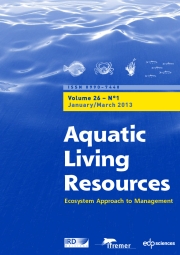Article contents
Experimental ecology: A key to understanding fish biologyin the wild
Published online by Cambridge University Press: 15 November 2005
Abstract
Because of natural complexity, field studies are often inconclusive with regards to the ultimate cause of a given change observed in wild animal populations. As a consequence, there is scope to develop an Experimental Ecology Approach (EEA). In this paper, we favour the use of experimental ecology studies to evaluate the effects of environmental factors on fish biology. We identify the advantages of EEA: disentangling the effects of several factors and identifying their respective roles, generating artificial scenarios and increasing our capability to collect and analyse data. This study emphasises the constraints of this approach: fish biological performances may be altered by rearing conditions, by domestication and by the prevention of some behaviours. It also considers the extrapolation of experimental results with regard to the sea including the realism of experimental design and the constraints of scaling or extending the results to larger scales. We also propose some experimental ecosystems which are well adapted to the requirements of EEA and a careful selection of fish species which fit this approach very well. Atlantic Cod (Gadus morhua) is identified as a good candidate for experimental studies and we present examples of the contribution of EEA to the description and quantification of the effects of environmental factors in this species. We conclude by highlighting the respective contribution of field studies (describing a situation in the wild and suggesting some possible causes) and EEA (allowing an active investigation of phenomena and identifying their final causes).
- Type
- Review Article
- Information
- Copyright
- © EDP Sciences, IFREMER, IRD, 2005
References
- 5
- Cited by


